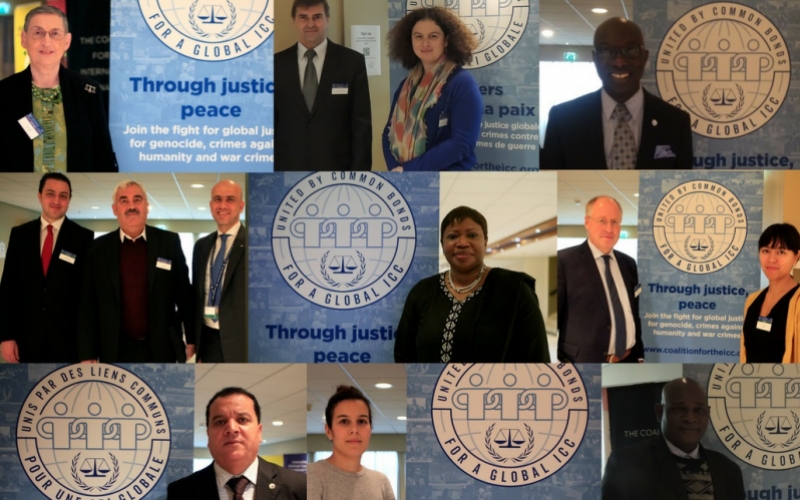ASP 15 Day Eight - Assembly ends with call for unity and dialogue on ICC

The 15th session of the Assembly of States Parties concluded today. States adopted final resolutions on the Court’s 2017 budget, and the catch-all omnibus resolution on strengthening the ICC. A side event was held on complementarity (national prosecutions of ICC crimes) in Central and West Africa.
In bringing the Assembly to a close ASP Vice President Sergio Ugalde (Ambassador of Costa Rica) thanked all states, ICC representatives, civil society and others for their cooperation and commitment, and for the constructive spirit of the session. He stated that we remain bound by our common endeavor to combat impunity and bring relief to victims of atrocious crimes, and called on all stakeholders to meet the challenges ahead and to be relentless in the defense of the Rome Statute system created 18 years ago.
The meeting ended with the traditional minute silence in memory of the countless victims of atrocities across the world.
Thanks for reading. Farewell to all delegates. See you next year.
See our curated Twitter collection for highlights from ASP Day 8
PLENARY SESSION
During this morning's plenary discussion, states parties passed by consensus resolutions on the ICC programme budget for 2017, permanent premises, cooperation, and amendments to rule 101 and rule 144 (2)(b) of the Rules of Procedure and Evidence.
The ICC budget for 2017 was set at €141,600,000. The Court had asked for €147.25 million - an increase of €9.86 million, or 7.2 per cent.
States Parties voiced their respect for the spirit of compromise and complemented the work of various facilitators. Before the adoption of the draft resolutions, China asked for the bureau and the ASP's attention on the exclusion of observer states in informal consultation processes, including on the omnibus resolution at this year's ASP and the creation of a facilitation on the activation of the jurisdiction of the crime of aggression limited to states parties.
Election of members to the CBF took place in the morning meeting, with Africa electing a member from Burkina Faso. The Eastern European group mutually decided to elect the Estonian candidate Mr. Urmet Lee, however they clarified that an agreement had been made that Mr Lee would serve the first half of the term, and following this a Bosnia Herzegovina candidate would replace them. Belgium noted that in this case, new elections would be necessary following the termination of Mr Lee’s membership.
The final plenary considered the report of the credentials committee and the report of the 15th session of the Assembly of States Parties, and adopted these reports officially. Japan pledged contributions to the Trust Fund for Victims.
The Assembly adopted the omnibus resolution – the catch all resolution on strengthening the ICC. Ghana expressed concerns over the transparency of the staffing practices of the Court, calling on the Registrar to provide a comprehensive report on the gender and nationality in staff postings by the end of January 2017. This was supported several states.
The Assembly noted the contributions of Ireland to the trust fund to facilitate the travel and participation of delegates from two developing countries at his year’s Assembly. The Assembly called on states to make contributions so as to enable further participation for underdeveloped states in future ASPs.
SIDE EVENT
Complementarity in Central and West Africa.
Speakers:
- Alioune Tine – Director, Regional Office for West and Central Africa, Amnesty International
- Karine Bonneau – Head, International Justice Desk, FIDH (moderator)
- Drissa Traoré – Lawyer and FIDH Vice President (Mali)
- Mathias Maroub – President of the Central African Observatory for Human Rights (CAR)
- Asmao Diallo – President of the Association of Victims, AVIPA (Guinea)
- Jacques Mbokani – Professor of Law, Catholic University of Louvain (DRC)
The side event focused on developments of complementarity in Central and West African States, namely the Central African Republic (CAR), Democratic Republic of the Congo (DRC), Guinea and Mali. Panelists provided witness testimonies of the situation in Guinea, presented developments in the domestic judicial processes in Mali, the jurisprudence of Congolese tribunals on Rome Statute crimes in DRC, and the creation and mandate of the Special Criminal Court in CAR. During their presentations, the speakers highlighted some of the domestic challenges in these countries and the need for political will and capacity building. It was also agreed that complementarity justice efforts are necessary in providing justice to victims. Questions arose from the floor on the applicable law for the CAR Special Criminal Court and its locations of operation due to security reasons.
Co-hosted by France, Senegal, Amnesty International, the International Federation for Human Rights.
See our curated Twitter collection for highlights from ASP Day 8
STATEMENTS AND NEWS COVERAGE
Letter to President Santos on the new peace agreement with the FARC
The letter to President Santos discusses the Human Rights Watch’s assessment of the justice provisions of the new peace agreement the government has reached with the Revolutionary Armed Forces of Colombia (FARC) guerrillas.
US: Trump Proposals Would Violate Rights, Harm Millions
US President-elect Donald Trump should rescind and repudiate proposals he has made that, if implemented, would harm millions of people in the United States and abroad, Human Rights Watch said in a letter to Trump from Executive Director Kenneth Roth.
Statement by Al-Haq on communication of Palestinian human rights group to the OTP
The groups urged the OTP to examine the Israeli closure of the Gaza Strip as a crime against humanity of persecution under the Rome Statute. The prosecutor is currently engaged in a preliminary examination of the situation in Palestine.
Please find ASP material, information, updates on our newly launched website.
Find out more about how the ASP works here and here
Find all ASP materials and documents on the ASP 2016 webpage
Read more on the Annual Assembly
Read more about civil society and the Rome Statute
